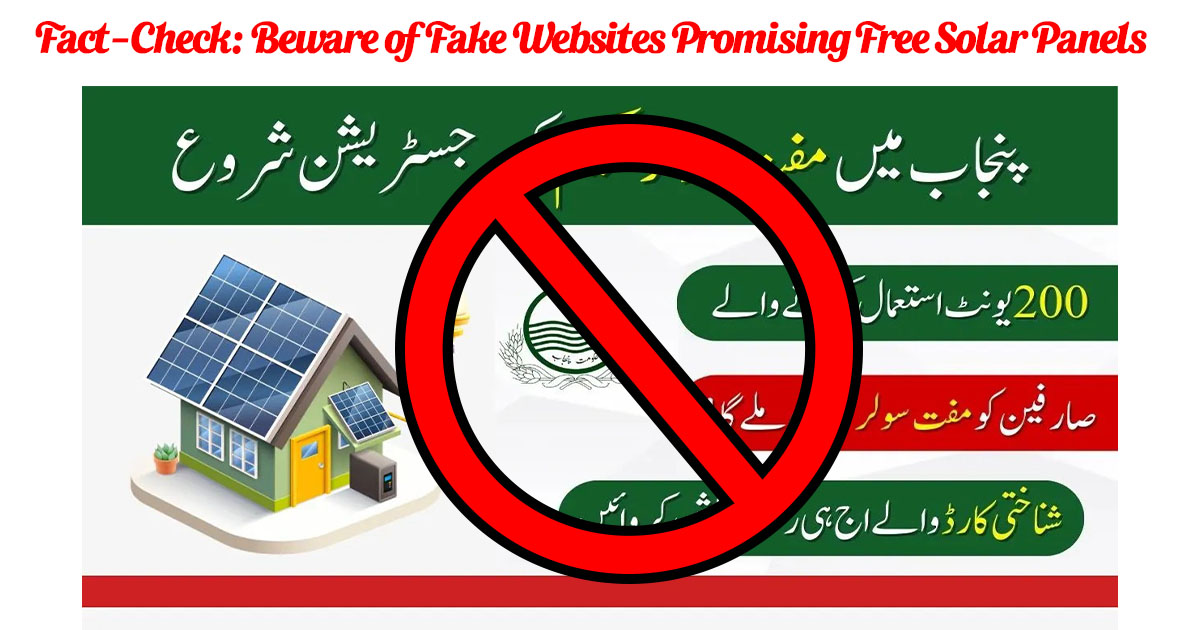Fact-Check: Beware of Fake Websites Promising Free Solar Panels in Punjab
As energy costs rise, the idea of free solar panels sounds like a dream for many Punjab residents. Recently, however, a website link—solar-panel-scheme-2024.blogspot.com—has been circulating on social media, claiming that Punjab residents can register to receive free solar panels through a government program. This supposed “Punjab Free Solar Panel Scheme” specifically targets households consuming between 100-500 electricity units per month, asking users to enter personal information such as their name and identity card number to qualify before a November 10 deadline.
However, this claim is entirely false. A closer investigation reveals that this website is not connected to any government program, as confirmed by officials and independent experts. Below, we’ll break down the facts using the PAS (Problem-Agitation-Solution) framework to clarify why this scheme is fake, explain how these scams operate, and offer advice on how to stay safe.
Problem: The Spread of Fake Solar Panel Schemes on Social Media
Social media platforms like WhatsApp, Facebook, and X (formerly Twitter) have recently been flooded with posts promoting a fake website promising free solar panels for Punjab residents. With an official-looking name and a deadline to create urgency, the website has already tricked many into sharing their personal details.
Given the Punjab government’s genuine interest in supporting renewable energy, many people are understandably excited by the idea of free solar panels and feel hopeful that such a program could ease their financial burdens. However, government representatives have clarified that this viral link is fraudulent and that the actual solar panel initiative has not yet started.
Agitation: Risks and Dangers of Falling for Fake Schemes
To understand the risks, let’s look at how these scams operate and why they are a cause for concern.
- Data Theft and Privacy Risks
Fake websites often exploit high-demand programs to lure people into sharing personal data. According to Adnan Mudassar, the project director of Punjab’s Roshan Gharana Program, this website is not linked to any government project. Mudassar emphasized that “all the websites circulating online are fake” and that any official announcements would be made through reputable media channels. When people provide their names and identity card numbers on fake sites, they expose themselves to data theft. This data can end up on the dark web, where it may be sold or used for various forms of identity fraud.
- Adware and Revenue Generation
In addition to data theft, many fraudulent websites use adware tactics to redirect visitors to other pages, often to generate ad revenue. This was confirmed by Anees Qureshi, an open-source intelligence analyst at Bytes for All (B4A), a digital rights organization. “These websites are designed to drive traffic to specific sites, often for paid ad placements,” Qureshi explained. Although users may not lose money directly, they are unknowingly contributing to the financial gains of fraudsters who set up these pages.
- Exploiting the Genuine Need for Solar Power Assistance
Many low-income households could truly benefit from government-supported solar power programs, making them vulnerable to scams that exploit this need. While Punjab’s Roshan Gharana Program is a legitimate effort to support low-income families with solar systems, registration has not yet opened. Mudassar reassured the public that the Punjab government will announce any official application process through credible channels, ensuring transparency and security for eligible families.
- Loss of Public Trust in Government Programs
The spread of fake schemes creates confusion and diminishes public trust in genuine government initiatives. If people are repeatedly misled by fraudulent sites, they may become hesitant to engage with future government programs—even legitimate ones. This mistrust can hinder the success of actual programs like Roshan Gharana, which aims to help low-income families access renewable energy solutions.
Solution: How to Protect Yourself from Fraudulent Websites
Understanding the red flags and taking simple precautions can help you avoid falling victim to these types of scams.
- Verify Government Schemes Through Official Channels
To confirm whether a government program is legitimate, always consult official sources. Government websites, press releases, and credible news outlets are reliable ways to check the authenticity of programs like the Roshan Gharana Program. Any legitimate government scheme would be announced through trusted media, rather than shared primarily on social media platforms without official confirmation.
- Do Not Share Personal Information on Unverified Sites
Fraudulent websites often ask for sensitive details such as your name, identity card number, or phone number. Unless the website is an officially verified government platform, avoid entering any personal information. Websites ending in “.blogspot.com” or other unverified domains are strong indicators that the page may not be trustworthy.
- Report Suspicious Websites
If you encounter a link or site that seems suspicious, report it to the relevant authorities. In Pakistan, the Federal Investigation Agency (FIA) handles cybercrime complaints, including fraudulent websites. Reporting these links can help prevent others from falling victim to similar scams.
- Stay Informed Through Digital Rights Experts
Experts in digital rights and cybersecurity, like Anees Qureshi at Bytes for All, provide valuable insights into the nature of these scams and how they operate. Following these experts can keep you informed about emerging scams and potential risks, helping you navigate the online space safely.
- Stay Updated on Real Government Programs
The Punjab government’s Roshan Gharana Program is a genuine initiative intended to provide solar systems to low-income families across the province. According to Mudassar, the registration process for this program has not yet started, and any genuine application details will be communicated through verified media channels. Staying updated on official announcements from the Punjab government or credible news sources can help you avoid being misled by fake sites.
Case Study: Punjab’s Real Roshan Gharana Program
In March, the Punjab government announced the Roshan Gharana Program, a legitimate initiative aiming to distribute 50,000 solar systems to low-income families. This program seeks to make renewable energy accessible to households struggling with high energy costs. However, as project director Mudassar clarified, registration for this program has not yet started. Once it does, the government will provide the public with transparent, secure channels to apply, ensuring that eligible families can access the benefits of solar power without falling prey to scams.





Good